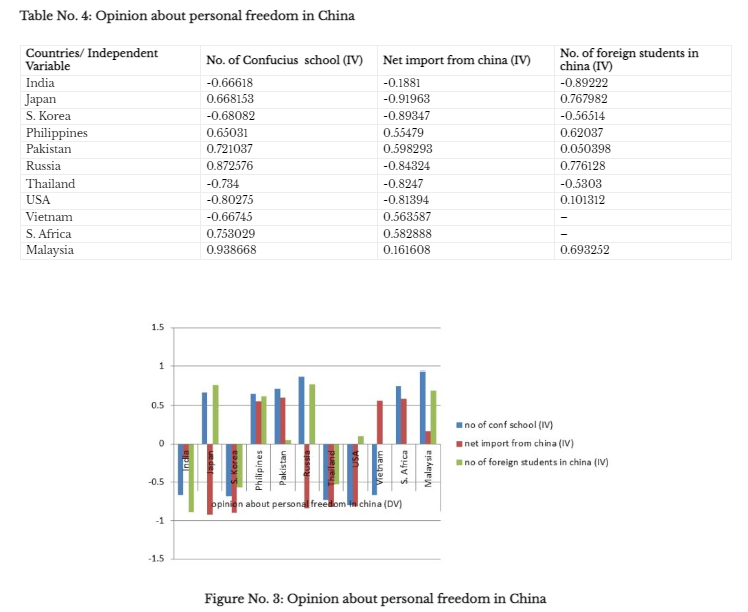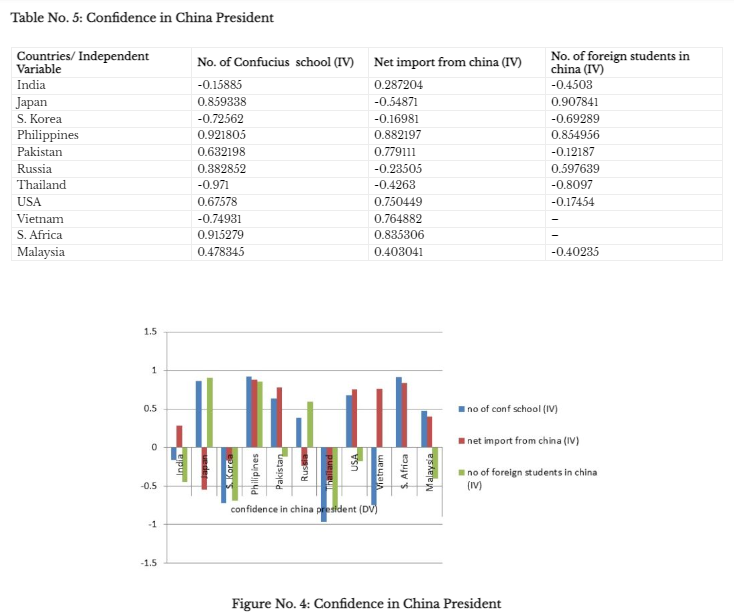National Power is the capability to influence others behavior to its advantage by way of coercion or efficaciously. Soft power is one of the crucial strategies for the development of any country successfully without oppression. It’s crucial for each country to maintain the bond between each other for the survival and as an instrumental tool for political propagation. China’s weakening relationship globally and Zero COVID tolerance is drastically hurting the soft power efforts. Due to pandemic, imports and foreign students, which had globally boosted China’s reputation earlier has gone down. This paper will reflect the changing paradigm of China’s soft power status over the years; pre & post COVID.
Keywords: Soft Power, International Relations, China
Introduction:
Power is the capability to influence one’s behavior according to its advantage by way of coercion or efficaciously. Soft power is one of the crucial strategies for the development of any country successfully without oppression. It’s crucial for each country to maintain the bond between each other for the survival and as an instrumental tool for political propagation. China’s weakening relationship globally and COVID free environment is drastically hurting the soft power efforts. Due to pandemic imports and foreign students, which had globally boosted China’s reputation earlier has now impacted adversely. This paper analyzes, the status of Chinese soft power varied over the years; pre & post COVID. Soft power is the ability to shape the perception not based on military power (also known as hard power) but through culture, trade, international & political relations to achieve desired goal (Nye, Soft power: the origins and political progress of a concept, 2017)1.
China’s position in the world has undergone significant changes in the international relations. Different countries have various opinions about China, personal freedom and confidence in their president. It spends billions of dollars in expanding the culture abroad to create global influence and one such spending is on establishment of Confucius schools. It also spends on foreign students in the way of offering scholarships.
China has employed various tools of soft power sourcing including Chinese culture, language, arts, aids, trades and investments to promote its influences abroad. National interest is the major propaganda for the use of soft power and influence globally (The Role of Soft Power in China’s Foreign Policy in the 21st Century , 2017)2.

https://www.britannica.com/place/China/ Leaders-of-the-Peoples-Republic-of-China-since-1949 3
The objective of the study is to assess the Dragon’s soft power in the current context. The study is explanatory in nature based upon secondary data with use of simple statistical technique of correlational analysis. The data for the current study collected is through desk & World Wide Web research and the study is purely based on secondary resource. Considering the past experience & knowledge of the authors in the current subject and selective literature review, it is highlighted that, the favorable opinion about China, opinion about personal freedom & confidence in Chinese President are considered as a dependent variable for the study.
The incumbent Chinese President is a unique person and the development in last few years in China, the Xi Jinping has reach to top notch posts which includes General Secretary of CCP, Chairman of the Central Military Commission (CMC) and President of the People’s Republic of China (PRC). It is imperative how world views the position of President Xi-Jinping, who is currently, considered as Supreme Leader of China after legendary Chairman Mao Zedong. These dependent variables react to the independent variables which are listed as, number of Confucius school, net imports from China and number of foreign students in China. These independent variables are very important part of China’s overseas perception management framework.
Interpretation of Data
1. Dependent Variables (D.V.) and its effect on the countries

The above graph represents that Pakistan has favorable opinion about China, In China’s personal freedom and confidence in Chinese President and on other hand Japan’s opinion about China is unfavorable.

The person’s correlations about the favorable opinion about China, considering the three independent variables were negative in case of India, S. Korea, Thailand, and Malaysia. The reason for this could be that these countries have their own culture and traditional educational system which was evolved in the modern times. It is important to note there could be interacting variables manipulating the opinion about China. These variables could be drawn from areas of geopolitical conditions, technology development and other economic issues. There is a scope of further study in terms of identifying such interacting variables and their effect on the opinion about China
Countries such as USA, Philippines and Pakistan have a favorable opinion about China with positive correlation considering the three independent variables. The reason for this could be the traced to closed geopolitical & economic ties of these countries vis-a-vis with China.
While countries like Russia, Japan, Vietnam has shown mixed reaction about the favorable opinion about China. This could be due to certain issue-based tie-ups with China. In the case of Russia, it is the political proximity while in the case of Japan; it is manufacturing & Trade with China. In the case of Vietnam, both the conditions are present.
It is also important to note that some countries have significant linkages with China in terms of Business, Trade and Economics while they have a stronger defense tie with USA. The diversity of the linkages are also dependent on the emerging concepts such as Techno-geopolitics and Techno-nationalism which has direct bearing on the countries Status, Hard or Soft.
3. Opinion about personal freedom in China (Dependent Variable)

The leading democratic countries such as India, US, S. Korea, Thailand have shown a negative correlation in terms of dependent variable considering three independent variables. While countries sometimes in their life span, experience the Unitary Presidential regime such as Pakistan, Philippines, Malaysia has shown a positive correlation for the dependent variable i.e., personal freedom in China. The third group of countries where there is mix correlation for dependent variable with respect to independent variable, these countries are Russia, Japan, Vietnam, the reason attributed to this could be the issue-based reaction for the dependent variable i.e., opinion about personal freedom about China.
4. Confidence in China president (Dependent Variable)

There is no definitive pattern observed in the dependent variable that is confidence in Chinese President with respect to the three independent variables. The reason for this could be the communication from office of the president, the governmental system in China and the trade linkages of countries with respect to China.
Conclusion
The current study tried to analyze China’s soft power vis-a-vis three independent variables: Number of Confucius School, net imports and foreign students. It has been observed existence of Confucius school affect the soft power adversely. This is in tune with recent statement of 4Mr. Rishi Sunak of UK. The foreign students in China have a profound positive impact with the exception of India, S. Korea and Thailand. Notably in case of US, the net imports from China have a positive impact and in Japan the other two factors have a profound positive impact. Although the number of factors studied is just three, it generally has explained the emergence of soft power. This would act as guidance so as to select which factors one can concentrate on, while spending efforts & resources in order to manage soft power status. The present study has certain limitation in terms of the selection of number of variables & number of Countries which can be increased in number in further studies. The scope of further study can be expanded in terms primary data, which can be collected through questionnaire, interviews and opinionnaire. It is also important to highlight the scope so to identifying interacting variables and their effect on the opinion about China along with independent variables considered in this study. It is also important to establish the causation than the correlation which is applied in the present study. The Chinese presence is not merely concentrated on the mere three independent variables: Number of Confucius School, net imports and foreign students, but it goes beyond it. In the current context, Currency, Financial Markets, Energy resources, global value chain including supply chain and manufacturing are some of the important ingredients by which China has linked to the rest of the world. These linkages would have a significant impact on shaping the opinion about China and hence it is important to broaden the scope of the research with keeping in mind these diverse variables by which China is coupled with the rest of the world. The present study concludes that the Dragon’s Soft Power status is evolving as response to new vibrant world order paradigm which is in re-calibration mode due to Covid-19 and geopolitical developments.
Reference
1. (Nye, Soft power: the origins and political progress of a concept, 2017)
2. The Role of Soft Power in China’s Foreign Policy in the 21st Century. (2017). International Journal of Social Sciences & Educational Studies. Retrieved from https://www.researchgate.net/publication/316179157_The_Role_of_Soft_Power_in_China’s_Foreign_Policy_in_the_21st_Century
3. Zürcher, Erik , Elman, Benjamin , Hsu, Cho-yun , White, Lynn , Rawski, Evelyn S. , McKnight, Brian E. , Suzuki, Chusei , Wilbur, C. Martin , Keightley, David N. , Franke, Herbert , Chan, Hoklam , Twitchett, Denis C. , Hucker, Charles O. , Feuerwerker, Albert , Lieberthal, Kenneth G. , Dull, Jack L. , DeWoskin, Kenneth J. , Young, Ernest P. , Lewis, John Wilson , Silbergeld, Jerome , Chen, Cheng-Siang and Liu, James T.C.. “China”. Encyclopedia Britannica, 23 Aug. 2022, https://www.britannica.com/place/China. Accessed 26 August 2022.
4. https://twitter.com/RishiSunak/status/1551483430373826565

